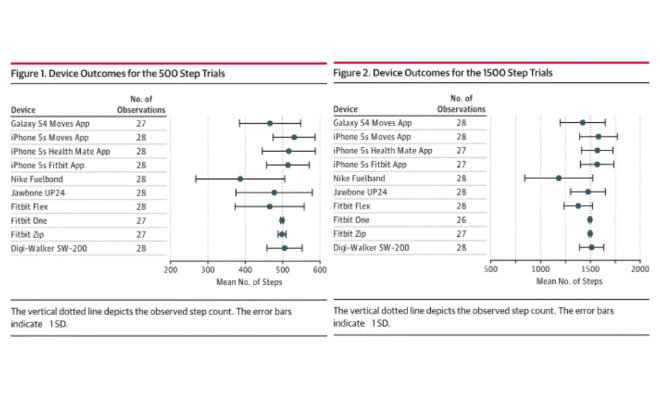Consumers searching for the best way to automatically log their daily activity may need to look no farther than the App Store, as a new study from the University of Pennsylvania shows that data collected by dedicated fitness wearables is generally no more accurate than that from a smartphone kept in a pocket.
"In this study, we wanted to address one of the challenges with using wearable devices: they must be accurate," said Penn medical student and lead study author Meredith A. Case, BA. "After all, if a device is going to be effective at monitoring — and potentially changing — behavior, individuals have to be able to trust the data. We found that smartphone apps are just as accurate as wearable devices for tracking physical activity."
To gather data, researchers loaded 14 participants up with 6 wearable devices: a Digi-Walker SW-200 pedometer, Fitbit's Zip and One clip-on trackers and Flex wristband, Jawbone's Up24, and Nike's Fuelband. In addition, an iPhone 5s sat in one pocket running the Fitbit app, Withings's Health Mate app, and ProtoGeo Oy's Moves app, while a Samsung Galaxy S4 sat in the other pocket running Moves on Android.
Each participant was then asked to walk on a treadmill at 3 miles per hour, twice each for 500 steps and 1,500 steps. Data collected from the smartphone apps had a range of -6.7 percent to 6.2 percent relative difference from the number of steps researchers observed the participants taking, while the wearables came in with a range of -22.7 percent to -1.5 percent.
According to the data, Nike's Fuelband was sometimes wildy off; Jawbone's Up24 and Fitbit's Flex booked the second- and third-largest deviations. Fitbit's Zip and One were nearly perfect.
Apple, of course, offers solutions in both categories. The iPhone 5s and iPhone 6 series contain built-in M-series motion coprocessors which constantly monitor device motion and feed step data to the iOS Health app.
Apple has also touted the health and fitness abilities of the forthcoming Apple Watch. That device includes a built-in accelerometer for tracking steps and total body movements.
 Sam Oliver
Sam Oliver







-m.jpg)






 Brian Patterson
Brian Patterson
 Charles Martin
Charles Martin


 Malcolm Owen
Malcolm Owen
 William Gallagher
William Gallagher
 Christine McKee
Christine McKee
 Marko Zivkovic
Marko Zivkovic









24 Comments
the absolute numbers are not very important, as long as one keeps using the same device its the relative numbers one uses to determine progress
1) I'd classify this as Fitbit being the best option of the bunch, although their Flex leaves something to be desired. Is that their oldest model? 2) I'd like to see movement not on a treadmill to see how that affects the accuracy of the results.
Movement in real world instead of treadmill would be interesting to test. 1. In real world the running tends to be a little more irregular 2. How well does the GPS readings of distances work in all of these.
The issue I've had with the 6 Plus is that, if I have it on me and am rocking on my La-z-boy, it counts each rock as a step. That means I can rack up the step count by just lazing around.
Of course, there is probably no way currently to avoid that, but it would be nice if there was a way to toggle the recording of steps.
[quote name="BestKeptSecret" url="/t/184755/smartphones-apps-equal-to-fitness-wearables-for-step-tracking-study-says#post_2674326"]The issue I've had with the 6 Plus is that, if I have it on me and am rocking on my La-z-boy, it counts each rock as a step. That means I can rack up the step count by just lazing around. Of course, there is probably no way currently to avoid that, but it would be nice if there was a way to toggle the recording of steps. [/quote] Not really. You'd forget to turn it back on and lose step data all the time. Far better solution is for you to set it on the coffee table. Problem solved.